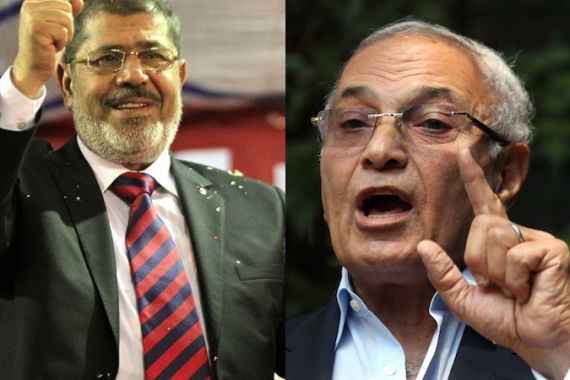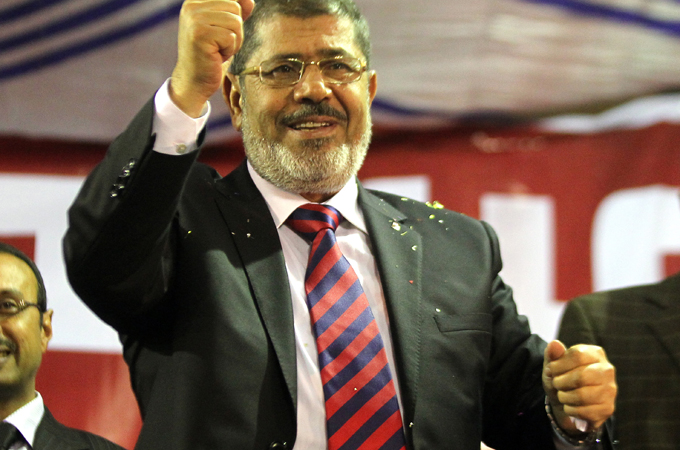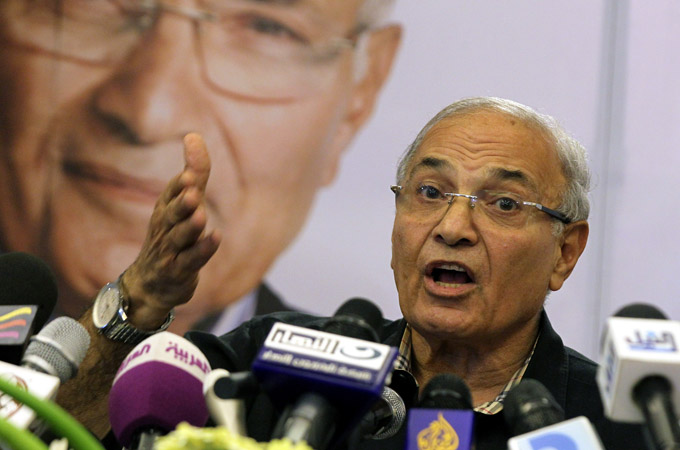Meet the candidates: Morsi vs Shafiq
A comparison of Egypt’s two presidential candidates and their policies on everything from free markets to faith.

The first round of Egypt’s presidential election, in May, pitted thirteen candidates against each other. They spanned a range of ideologies: former generals and spies, conservative Islamists, Nasserists and liberal activists.
The runoff involved just two candidates: Mohammed Morsi, from the Muslim Brotherhood; and Ahmed Shafik, the last prime minister under deposed president Hosni Mubarak.
 |  | |
|---|---|---|
| Mohammed Morsi | Ahmed Shafiq | |
|
Trained as an engineer, educated in the United States, Morsi was long a behind-the-scenes operator in the Muslim Brotherhood’s guidance office before he entered electoral politics. | Background |
Shafiq rose through the air force, eventually reaching the rank of commander; in civilian life, he served as aviation minister and Mubarak’s last premier. |
|
Morsi’s stated economic policies are mostly free-market, but with a heavy emphasis on improving social services. He has pledged to reduce unemployment to seven per cent within his first term, and to cut inflation and public-sector debts; his platform calls for big new infrastructure spending, and for maintaining many subsidies. He has said little about the role of Islam in economic policy, beyond proposing a zakat (charity) fund to help poor Egyptians. It would be financed by a two per cent tax. | Economy |
Shafiq’s plan is vague, but appears slightly more statist than Morsi’s, with talk of public-private partnerships. He has emphasised infrastructure, including a push for nuclear energy and new water purification plants; much of this would be financed through foreign investment and aid from wealthy neighbours in the Gulf. Farmers would receive price supports and debt relief. His plan for social spending is less ambitious than Morsi’s, though it does call for universal health insurance benefits. He also calls for a national minimum wage, and higher pay for public-sector employees. |
|
Morsi’s platform describes Egypt’s Mubarak-era foreign policy as “lost and confused,” and promises a “balanced approach.” In regional affairs, he has promised to “support the Palestinian people in their legitimate struggle”; to improve relations with the wealthy Gulf Co-operation Council countries; to reform the Arab League. Africa would also receive a renewed focus, with a particular emphasis on securing Egypt’s supply of water from the Nile. As for the West, Morsi wants to end “subordination” in Egypt’s relationship with the United States, and to encourage European investment in Egypt. | Foreign policy |
Shafiq, like his opponent, promises to support the Palestinian people. His plan prioritises Egypt’s neighbours, Libya and Sudan; elsewhere in the region, it aims to boost investment from the Gulf. Further afield, he wants to strengthen ties with the “BRIC” countries. Brazil is identified as a key relationship because it is a major supplier of imported wheat and meat for Egypt. Relations with the US are barely mentioned in Shafiq’s official programme. |
|
Morsi’s official programme does not mention the military. His public statements have been mixed. In a television interview earlier this month, he said he would select his defence minister after consultation with the ruling Supreme Council of the Armed Forces. But he has also said that “no entity will be above the constitution,” and said he would not shield the military budget from oversight. | Military |
Shafiq’s programme pays homage to the military’s “central role” in Egyptian life. It promises to fulfill many of the army’s central demands for the next president: Shafiq describes them as the “protector” of the constitution, for example, a designation which would effectively give the military veto power over a civilian government. And he promises to shield at least part of the army budget from parliamentary scrutiny, by stipulating that the legislature cannot interfere with the army’s right to keep secrets. |
|
Morsi has promised not to turn Egypt into a cleric-led “theocracy,” and says he will respect the rights of all religions. But Morsi, and the Muslim Brotherhood more generally, want to make Islam a central part of governance. He drafted a model platform for the Brotherhood in 2007 which called for barring women and non-Muslims from the presidency. He has also suggested creating a council of Islamic scholars to “advise” the parliament, though he says its recommendations would not be binding. | Role of religion |
Religion is, not surprisingly, one of the areas of sharp contrast between Shafiq and his opponent. His platform says little about faith, save for a promise to create a “civil state” with equality for all groups, regardless of religion or gender. The only reference to Islam is a provision about improving Al-Azhar’s standing as an institution of higher learning. Shafiq went so far as to threaten dissolving the Muslim Brotherhood’s Freedom and Justice Party, and the Salafi Nour Party, unless they stopped “mixing religion with politics.” |
|
Morsi has not said much on this subject. The Muslim Brotherhood has at times — when it is politically convenient — joined the protests in Tahrir Square, and so Morsi is not expected to crack down heavily on protests. He has said little about whether he would seek to criminalise certain kinds of speech on religious grounds. It seems likely, though: The Muslim Brotherhood-dominated parliament has already pushed for a ban on Internet pornography. | Freedom of speech, protest |
Shafiq has pledged several times that he will not arrest protesters or criminalise dissent. “Tahrir Square has witnessed what you have done for Egypt. I promise that it and other squares across the country will continue to remain free and secure for the freedom of expression,” he said earlier this month. Yet he has also promised a harder line against “unrest” in the country. The New York Times reported last month on a speech Shafiq gave at the American Chamber of Commerce, in which he suggested using “executions and brutal force” to restore order. He told voters this month that he would restore security within 24 hours of taking office. |